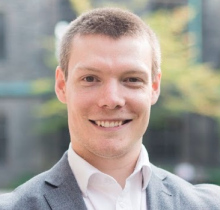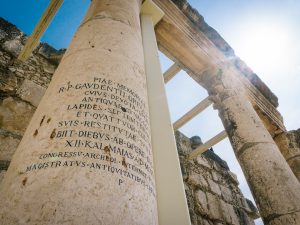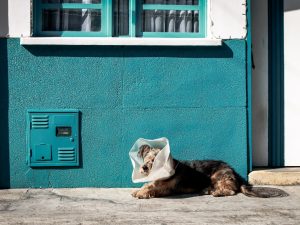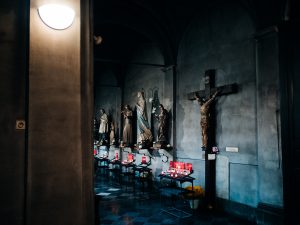There’s a Turkish proverb I remember reading years ago that says that “the heart desires neither coffee, nor a coffee shop; the heart desires good company.” This is very poetic, and very sentimental, but misjudges my caffeine addiction by a few miles.
Hello. My name is Wesley. And I am a coffee addict.
I have been for a few years now. It started out during a co-op program in highschool where I spent a semester with the Ontario Provincial Police, and the officers I would ride along with would buy me coffee. Then I graduated to making it for myself in the morning; finally culminating in my appreciation of good coffee. Of trying to figure out the nuances of different blends and brews like the difference between coffea liberica, Arabica coffee, and robusta coffee. I enjoy the complexities of the flavours and the differences in the blends. So I was surprised a number of years ago, when reading about the history of coffee, by how intricately linked it was with another aspect of my upbringing: the Islamic world.
Did you know that the history of Islam and coffee traverses centuries? And that without the advent of Islam, the world’s most popular brown liquid may never have reached its Tim Hortons and Starbucks sipping, and Second Cup consuming fame and imfamy?
A Sufi-sticaed drink
Coffee’s origins, although shrouded in some speculation, do have a rich (pun intended) history within the Islamic world. Yemeni traders began growing coffee crops and were the first to actively cultivate the plant. This was mainly for their use in the religious rituals of the charismatic Islamic branch of the Sufis. The Sufi adherents are said to have made a concoction with the beans, that when drank would create a feeling of intoxication during their Qur’anic chants, many of which are said to have gone day and night for long spans of time.(1)
Just brew it
Coffee continued to spread throughout the Arabian peninsula, becoming popular in remote villages and big cities alike. The Yemeni port of Mocha was the primary export location for coffee, and by the early 1500s, cities like Mecca, Medina, Cairo, and Baghdad became importers as the demand for the brew grew.(2) In fact, ancient historian Ismail al-Jazari (AD 1136-1206) comments that:
“[Coffee] was drunk in the sacred mosque of Mecca itself. So that there was scarcely a circle of divine remembrance or celebration of the birth of the prophet, where coffee was not present. They drank it every Monday and Friday evening, putting it in a large vessel made of red clay. The leader ladled it out with a small dipper, and gave it to them to drink, passing it to the right while they cited one of their usual supplications.” (3)
As coffee came to be known as “the wine of Arabia,” coffee houses became a popular place for traveling clerics, thinkers, teachers, and traders to congregate. Attracting all sorts of perspectives, these Saudi Starbuckses were centers of discussion on politics, culture, and religion, earning titles and nicknames such as “mini schools of the wise,” and “penny universities”.(4)
Beans of the Infidels?
The Battle of Vienna took place at Kahlenberg Mountain near Vienna on September 12th, 1683. The imperial city had been besieged by the Ottoman Empire for two months and marked the first time that the European Commonwealth and the Holy Roman Empire had collaborated in a military endeavor against the Ottoman Turks. The battle was finally won when the combined forces of the German, Polish-Lithuanian, and Italian forces pushed back the Ottoman hordes, causing them to flee.(5)
However, in the rush to leave the battlefield, the Muslim army left a great deal of their loot, among which were large sacks of black beans which the Ottoman empire had taken from the kaffa region of Ethiopia.(6) Curious about the beans, the story goes, the Europeans invoked a Turkish prisoner who showed them how to cook the beans into a drink known as “kahve,” a name the prisoner wrongly thought derived its meaning from the Arabic word “kafir”, meaning “unbeliever” (or more crudely, “infidel”) as the beans were harvested from the unbelieving regions of Africa. This “kahve” was mispronounced by the Italian, Polish, and French as “cafe” or what we now know as “coffee”.
A drink baptized by a Pope
Later that year, Polish officer Jerzy Franciszek Kulczycki opened Vienna’s first coffee house and soon coffee became popular across Central Europe. However, due to its association with Islam it remained a controversial beverage. Posed as the antithesis to wine (and therefore, to the sacrament of the Eucharist), many church officials preached against the laity drinking it, referring to it as the “black drink of Lucifer”.
The story goes that Pope Clement VIII was petitioned to declare coffee “the drink of the devil” due to its association with Islam. However, after tasting it, the Vicar of Rome is said to have declared:
“Why, this drink of Satan is so delicious, we shall cheat the devil by baptizing it. It would be a pity to let the infidels have exclusive use of it. We shall make it a truly Christian beverage!”(7)
That Franciscan flavour
Also in 1683, a Capuchin Franciscan friar, Marco d’Aviano, was sent to encourage the troops of Vienna during times of siege and battle with the Muslim armies. Marco managed to get his hands on some of the confiscated coffee beans, but was not pleased. In order to compensate for the bitterness of the drink he famously sweetened the drink with milk and honey. This became so popular among the Italians, and the French thereafter, that it was known as a “Cappuccino” both after the Capuchin monk who famously invented it, and for its color which resembled the shade of light brown of the monk’s robes.(8)
The world next door
We live in a much smaller world than that of previous generations. Information at our fingertips, food from across the globe, and people of all stripes, tribes, creeds, and nations living next door. Jesus calls us to “make disciples of all nations” (Matthew 28:19) and the reality is that sometimes the nations are closer than we may even realize. Whether you’re a macchiato man, an Americano aficionado, espresso expert, or a latte lady, the brewed beverage has an interesting history.
Sitting over a cup of coffee has worked to break down barriers since its inception. These days, the Islamic world is just as close as your morning cup of java.
There are 3.3 million Muslims in the US, nearly 2 million in Canada, and 19 million across Europe. Theodore Epp once said that, “God has given believers the responsibility of spreading the gospel to all the world, and we need to use all at our disposal to accomplish this task.”(9)
Maybe a cup of Joe and a story about the wine of Arabia is a good way to start?
Notes:
- Martin van Bruinessen & Julia Day Howell, Sufism and the “Modern” in Islam, London: I.B. Tauris & Co Ltd. (2007), 163.
- Daniel W. Brown, A New Introduction to Islam (3rd Ed.) Oxford: John Wiley & Sons, Ltd., (2017), Ch. 10 (Kindle Version).
- William H. Ukers, All About Coffee, Egypt: Library of Alexandria Press (1922), 76-77; E. van Donzel, Islamic Desk Reference – Compiled from The Encyclopaedia of Islam, Netherlands: Brill (1994), 70.
- Joshua Craze & Mark Huband, The Kingdom: Saudi Arabia and the Challenge of the 21st Century, London: Hurst & Comapany (2009), 273.
- Caroline Finkel, Osman’s Dream: The Story of the Ottoman Empire, 1300-1923, New York: Basic Books, 286-287.
- Robin Doak, Great Empires of the Past: Empire of the Islamic Word, New York: Chelsea House, (2010), 13.
- Bennett Alan Weinberg & Bonnie K. Bealer, The World of Caffeine: The Science and Culture of the Word’s Most Popular Drug, New York: Routledge, (2001), 67.
- Time Out: Rome, New York: Universal House, (2007), 78.
- Theodore H. Epp, Strength for the Journey, (1984), 260.
"*" indicates required fields
Share this!
About the Author





